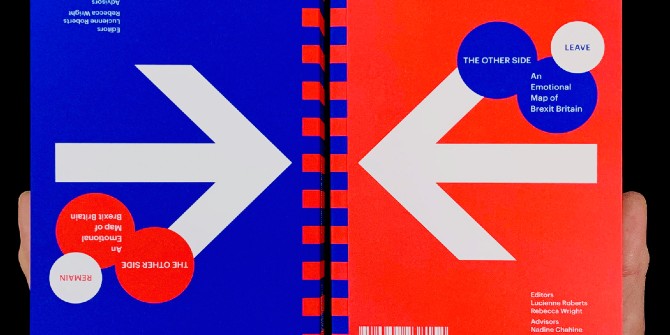Leavers are prejudiced and Remainers are elitists – or so the popular caricature goes. Eleni Andreouli (Open University) finds much more nuanced strands of public opinion about Brexit.
Brexit has, it is said, divided the UK into a country of leavers and remainers, an identity divide that seems to have persisted over the course of the post-referendum era (Hobolt & Tiley, 2019). In the context of this polarisation, support for remain has often been described as elitist, while support for Brexit has been branded as xenophobic and racist. It is telling that campaigners for leaving the EU labelled pro-EU campaigning as Project Fear (for keeping the UK out of a supposed fear of venturing out to the world as an independent and sovereign country), whilst campaigners for Remain dubbed the Brexit project as ‘Project Hate’ (because it is supposedly anti-immigration). These two constructions are based on the same foundations: that to be prejudiced is both morally wrong (because it means thinking ill of others) and irrational (because it is based on pre-judgement). According to a large tradition of social psychological scholarship, stemming from the pioneering work of Billig and colleagues (1988), this ‘norm’ against prejudice is a central tenet of liberal ideology as manifested in everyday political discourse.

These constructions are politically consequential in the context of Brexit. By constructing Brexit supporters as xenophobic and Remain supporters as tolerant, Brexit is frowned upon as nationalistic project. On the other hand, casting Remainers as elites who are themselves prejudiced against the ‘ordinary people’ that voted Brexit, constructs Brexit as a democratic project that acts upon the ‘will of the people’.
In research with colleagues, we studied the relationship between constructions of Brexit and of prejudice, but
“instead of seeking to establish whether support for Brexit is indeed the result of prejudice, [we argued] that constructions of prejudice are complex symbolic resources which help people position themselves and others within the changing political landscape of Brexit Britain.”
Using data from focus groups before and after the EU referendum with both Leave and Remain voters, we found, as anticipated, that the connection between support for Leave and prejudice was a widely shared frame of reference, among supporters of both Leave and Remain. However, that frame of reference was endorsed and resisted in equal amounts.
Constructing an image of the ‘reasonable and tolerant Leave voter’ was common in our dataset. This was achieved through several discursive strategies such as linking Brexit support with values of humanitarianism and anti-racism, thus countering the supposed prejudicial Eurocentrism of the remain project. In the words of one research participant:
“Leaving the EU kind of helps people that are refugees and- or like non-EU citizens more in terms of migration, I suppose? Because it means that people who are from Europe aren’t in front of the queue. It will be equal for everyone now, that’s why it’s less racist.”
This ‘cosmopolitan anti-Europeanism’ position draws on the principles of colour-blind equality and meritocracy which are often employed to deracialise immigration management (Gibson & Booth, 2018). On the other hand, we also found Eurosceptic accounts that were positioned against neoliberal global capitalism, as encapsulated in EU policies, but were also firmly pro-diversity and pro-immigration. In that case, a position of ‘pro-diversity anti-globalisation’ was developed by participants.
What are the implications of these findings? Our work suggests that ‘what the public thinks’ is more nuanced than the polarised political landscape of Brexit suggests. People are not just liberals and cosmopolitans, or nationalists and xenophobes. Rather, lay political thinking is much more nuanced and much more creative. What is needed is political leadership that can mobilise citizens beyond narrow us/them polarities to new political visions that, instead of caricaturing ‘the people’, builds on citizens’ capacity for pluralism and multivoicedness.
Offline reference
Billig, M., Condor, S., Edwards, D., Gane, M., Middleton, D., & Radley, A. (1988). Ideological dilemmas: A social psychology of everyday thinking. London: Sage.
This post represents the views of the author and not those of the Brexit blog, nor LSE.






Well, knock me down with a feather 🙂 People are far more nuanced than politicos think. Its groupthink to imagine a perfectly categorised electorate. Problem is to campaign effectively a level of analysis that categorises is necessary. In local elections that goes down to types of voting patterns in streets and houses. The thing to remember is the political intelligencer (a wide and sweeping category inc. you and me) spend a lot of time thinking about such matters. Go out door step canvasing and you realise that a majority of normal folk give, maybe 15 minutes a week to such matters. [I fought 3 elections last year and sadly we didn’t have any locals this year].
Makes one weep to realise how these perceptions might have been neared by holding citizen’s assemblies, even during and after the referendum. But it was always supposed to be too late for that.
How could ‘during the Referendum’ be too late to discuss the issues nationally?
That was precisely the perfect time to be doing so, and the public joined in with gusto, as I recall.
‘Gusto’ during a few weeks of a referendum campaign is no match for the type of thoughtful and ievr-better informed deliberation that was engendered by citizens’ assemblies over several months ahead of the Irish abortion vote and which would have put paid to the glut of false and misleading information circulated during the UK EU referendum. But – citizens’ assemblies need organising well in advance.
So Citizens Assemblies are the only forum you’ll accept as being valid places for debate?
On what do you base that utter tosh?
The Referendum debate across the UK commenced once the Tories had won the election in 2015. There was some misleading information, but it was up to the individual to decide the validity of the arguments.
After all, the biggest lie told in the Campaign was Cameron repeatedly stating that the EU was ‘reformed’; this was AFTER he had been told by the EU in February that no reform was going to take place.
However, one fact cannot be ignored, and that is until all 33 million voters state to what extent (if any) the campaign influenced their vote, no-one can say for certain how much. I certainly would have voted Leave every day after we joined the EEC, had I been given the chance (too young in 1975).
In fact, I paid more attention to the Remain Campaign’s output, just to see what lies it would be coming out with. It steadfastly refused to acknowledge the existence of EU Regulations and the effect they have on member states.
Best to read another person’s comment carefully and maybe dwell on it at least for a few seconds before making a response.
“Best to read another person’s comment carefully and maybe dwell on it at least for a few seconds before making a response.”
If you wish to correct me on anything, feel free to do so by the use of quotes, etc.
Your failure to do so thus far has been noted.
I had clearly expressed a feeling and a basis for believing there might have been a better way. Had you absorbed that, I doubt whether you would have stated that I claimed that citizens’ assemblies are “the only forum” I would accept or have been so rudely derisive. Why are you still so angry – after so much has gone the way you wanted?
” Had you absorbed that, I doubt whether you would have stated that I claimed that citizens’ assemblies are “the only forum” I would accept ”
But I didn’t state that.
I asked you to clarify what your earlier comment had meant.
So don’t lie about what others have stated.
“Why are you still so angry – after so much has gone the way you wanted?”
It’s not anger. I’m simply fed up of Remoaners banging on about the Referendum campaigns and result, and lying about what Leavers have stated.
That’s why I pulled you up for it.
“So Citizens Assemblies are the only forum you’ll accept as being valid places for debate?”